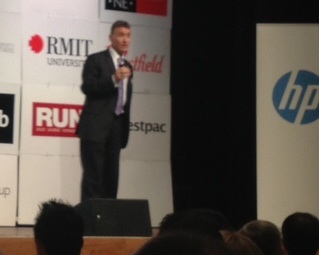Optus seeks bill shock breaker

In what the company has foreshadowed as a massive overhaul of its mobile plans, Optus country CEO Kevin Russell revealed that the company has placed limits on the amount of money it charges for customers who go over their monthly limit.
Russell revealed at an Australia-Israel Chamber of Commerce lunch in Melbourne on Thursday that the company had introduced caps late last year. Where customers went over their monthly limit by $200, they would not be charged any more fo that month, while roaming customers would not charged any more for the service when they reach $500 over their monthly limit.
"If customers go over, they're not being stung with $2,000 or $3,000. When it gets to $200, it stops."
Optus' quiet introduction of the breakage caps saw the company take a hit to its revenues in the last results, Russell said.
"We got hit, we got hit in terms of our revenue, and our ARPU [Average Revenue Per User] was going backwards."
But driving revenue from charging customers excessive amounts for overusing their service was not sustainable in the long term.
"As an industry, we have become increasingly reliant on non-core revenues; revenues that come from breakage fees," he said.
"I don't believe you can move forward unless you address those decisions head on. And if you have unsustainable revenues that are upsetting your customer loyalty, then I think you have to address it head on."
Russell said the company would have new plans in the next few weeks that would go even further to reduce bill shock issues. While Optus subsidiary Virgin Mobile has gone down the path of throttling usage speeds, Russell indicated that Optus would not bring throttling for its plans. The CEO said people should not be punished just for wanting to use their smartphones.
"We would like to get plans out into market for people to use smartphones exactly how they want, without fear of being penalised," he said. "If people want to use 4G and they want to use smartphones, they should be free to use them. If they go through the cap, they should be free to pay just small reasonable amounts to go up to the next level."
Russell indicated that one such option would be for people to buy their handset outright, which would give the customer the option of moving from one plan to another as they pleased.
Russell, who was previously the CEO of 3 Mobile in Australia before it merged with Vodafone, returned to Australia after five years in 2012 to head up Optus in Australia. He said that in his five years, the level of telecommunications service in Australia had slipped, while in the US and the UK it had greatly improved.
He said that for too long, the telcos had been too focused on chasing new customers, and had in turn, neglected existing customers who would often see that customers who had just signed up to the networks were now getting a better deal than the loyal customers. Russell said that this would change and Optus had now shifted the price up on its plans so that new customers would not get a better deal than the existing customers.
The CEO said that rather than having Optus focus on sales, his goal was to make Optus a beloved brand recommended highly by the customers.
"We want to be the most loved and recommended service brand in Australia," he said. "It's a huge challenge."
Citing Virgin as a brand he admired, Russell said that Optus would establish itself as being a pure service company.
"Our purpose as Optus is to serve our customers. We are a service brand. We're not a digital brand or a multimedia brand, we're a service brand," he said.
He said that the aim would be to transform the company in the next 12 months, now that a restructure of Optus had been completed.
"I think any CEO who talks about change will say that cultural change is the number one challenge they have. We've restructured the whole organisation to be centred around the customer organisation, which is supported by sales and marketing, not led by sales and marketing," he said.
Russell said that while change would come easier in the ranks of executives, he said that it was important to get the culture change working right down at the customer-facing level with contact centre staff and retail staff. He said this was a long training and induction process, but Optus had already started work on it.
"Culture we are moving on quite significantly."
Telstra's second bite of the NBN cherry
The CEO said both Labor's fibre-to-the-premises National Broadband Network (NBN) and the Coalition's fibre-to-the-node network were viable options, but said he was concerned that, under a Coalition policy that would require renegotiation with Telstra over its infrastructure deal with NBN Co, competition would swing even further in Telstra's favour.
"I just do think that if there is a change of government, and if there is a change in structure to fibre to the node, I assume there will be a renegotiation [with Telstra]. What will that renegotiation look like? Will it be something that is another bite of the cherry for Telstra to do better again?
"I think that is a genuine concern because the first NBN deal was very strong for Telstra, so will the next deal be worse? No it won't be."
Josh Taylor travelled to Melbourne as a guest of Optus.
